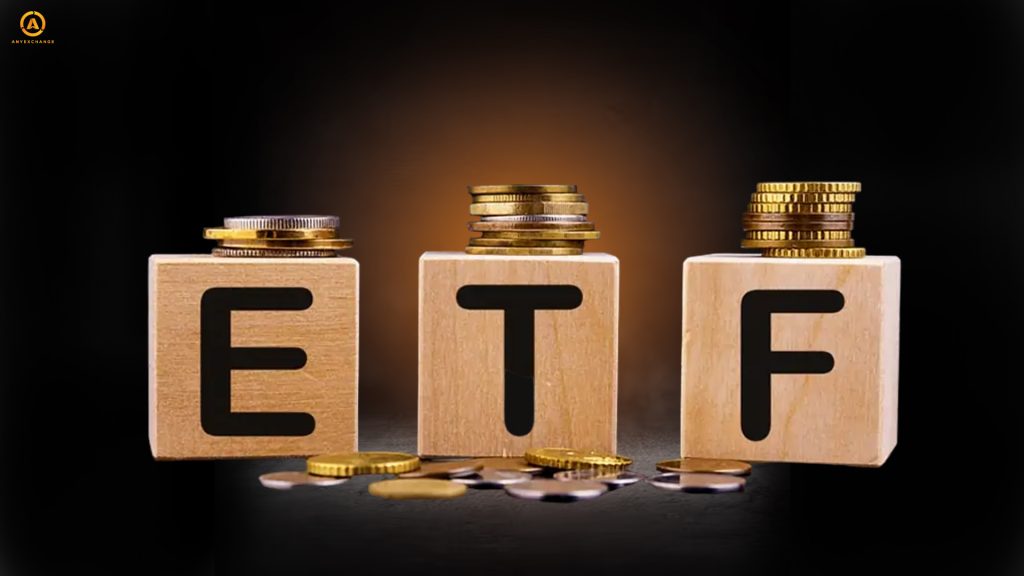
You may have heard that spot bitcoin ETFs have shaken up the market. Their approval in the U.S. earlier this year changed bitcoin’s cyclicality (!). It started to rise without waiting for a halving in April, which would have been natural according to established market cycles.
Cryptocurrency ETFs have served as a bridge between stable traditional financial instruments and the volatile world of cryptocurrencies. They combine the flexibility and potential of digital assets with the liquidity and familiarity of traditional equities. That’s why they have been in such high demand, and new investors unfamiliar with the digital asset market have rushed in en masse to join the ranks of cryptocurrency enthusiasts.
Let’s understand what cryptocurrency ETFs are in detail.
What are Cryptocurrency ETFs?
A cryptocurrency ETF (exchange-traded fund) is a type of mutual fund that tracks the value of one or more digital assets. Its shares are traded on traditional stock exchanges and are available to a wide range of investors. Anyone can buy or sell shares of a tokenized ETF. In this way, an investor invests in a cryptocurrency without becoming its direct owner. Such investment funds can track multiple tokens (bitcoin, ethereum and others) or specialize in one cryptocurrency. The value of shares in such funds changes depending on the changes in the value of the underlying digital asset. This allows investors to make a profit.
Cryptocurrency ETFs offer a way to earn money on a digital asset without having to store it. An investor does not need to understand the nuances of private keys, cryptocurrencies and secure storage. They simply buy a familiar product in the form of shares on a traditional exchange-traded platform. Moreover, unlike cryptocurrencies, the purchase of shares in such investment funds is regulated by law. Investors are attracted by the fact that they can make their investments in compliance with all legal requirements by simply buying shares in a cryptocurrency fund. Thus, such cryptocurrency funds offer new investment opportunities: it is possible to invest in digital assets without all the risks associated with direct ownership.
The cryptocurrency is purchased by the fund, which remains its direct owner. The Fund may hold securities, commodities and precious metals. The U.S. Securities and Exchange Commission has recognized BTC as a commodity (the issue of ETH and other cryptocurrencies is still under discussion), accordingly, Bitcoin ETFs track the value of the commodity that is the collateral of such funds.
Advantages of ETFs

Risks of Cryptocurrency ETFs

What is the difference between traditional and cryptocurrency ETFs?

It is insignificant, as cryptocurrency ETFs were launched similarly to traditional stock funds. Both traditional and cryptocurrency funds track the prices of the underlying assets. As cryptocurrencies are beginning to be equated with a commodity by the SEC, cryptocurrency ETFs track them as a commodity.
Both ETFs are traded on exchanges. In both cases, the investor does not own the asset directly.
The main differences can be seen as follows:
Historical and Geographical Context
Various ETF derivatives are also available in different countries around the world. One of the most famous is ProShares’ Bitcoin Strategy ETF (BITO), which was listed on the New York Stock Exchange in 2021.
The Future of Finance Fund (GFOF), managed by Grayscale, is listed on European exchanges. The ETF includes stocks of public companies specializing in blockchain technologies, cryptocurrencies and asset tokenization.
Commissions. What are the costs to the investor?
Some issuers, in an effort to attract as many clients as possible, offer zero commissions for a period of time. These are most likely funds that are trying to reach a certain level of assets.
In general, commissions vary in the range of 0.5-1.5% per annum. This is a management fee that is usually charged on the total amount of assets under management.
For short-term traders, these costs are usually not important. They are more concerned with the availability of technical trading tools that are provided to them. The situation is different for long-term investors. For them, the size of the commission can be a factor in deciding on a particular ETF. After all, these management costs can have a very significant impact on overall returns over the long term.
One of the most expensive is the Grayscale Bitcoin Trust (GBTC), which is not even thinking of lowering the bar for the amount of commissions. Its fee is 1.5% per year. For comparison, BlackRock’s iShares Bitcoin Trust (IBIT) charges 0.12% for the first $5 billion of crypto assets during the first year, then 0.25%.
In the context of this issue, it is also interesting that ETF managers, professionals working in the field of TradFi, are now interested in living and developing cryptocurrencies. Receiving large commissions from the growing bitcoin, they are definitely revising their attitude to the world of decentralized finance. That is, they no longer see cryptocurrencies in opposition to the traditional financial systеm, but on the contrary, in symbiosis and cooperation.
Cryptocurrency ETF Client Structure
After the triumphant approval of 11 spot bitcoin ETFs by the SEC in January this year, the market held its breath waiting for a massive influx of funds from institutional investors. However, this did not happen. Nine months later, analytical data shows that their participation has been minimal. The amount of accumulated BTCs in the funds’ balances has not changed significantly: it was 850,000, now it is 1,050,000. The difference is only 200,000 BTC.
According to analysts, 85% of investors in the ETF segment are not institutional investors. The vast majority are small retail investors making transactions in the modest range of $11,000 to $16,000.
Retail interest has also been fueled by active promotion of ETFs in the U.S. media. Outlook
Given the high level of investor interest and the interest in cryptocurrency ETF funds themselves, there is no reason to believe that the segment has no future. Their widespread acceptance, the continuation of the Bitcoin ETF and Ethereum ETF campaigns show a positive trend. Now the market expects the approval of Solana ETF and then other altcoins.
Investors are ready to diversify their portfolios with new products, enter a new market with minimal risks and make a profit. If cryptocurrencies are recognized as an asset class, this will further stimulate and activate the process. As the regulatory environment evolves, cryptocurrency ETFs will be able to present themselves as a standard investment product.
So their prospects are promising.
Thank you for reading our article. Invest safely and profitably!
AnyExchange is an international cryptocurrency exchanger that has been successfully operating in the financial market for over five years. On our platform you can exchange the most popular cryptocurrencies at the most favorable exchange rate. We conduct transactions with both electronic and cash money. The site offers money transfers all over the world.





